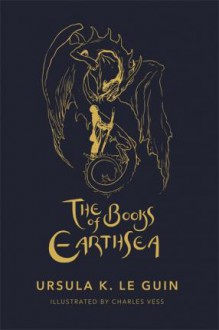
I don't know what it is with Ursula Le Guin, but every one of her books, whatever the rate I end up giving the whole, have at least one instance where she emotionally wreaks me, and it's always exquisite. It's like looking at the page and feel like telling her "Damn, that's one beautiful dagger you are stabbing me with"*
I feel like pointing it out just because in this case, since it happens to clear my 3stars Le Guin base bar with ease to nestle by World is Forest, Forgiveness, and Left Hand. Maybe even like a caveat. Just so I can qualify that I'm biased and it's all emotionally stabbed city here.
And what stabs ME particularly, beyond the punctual sad, is the theme. While at first sight the theme seems to be religion and spirituality vs technologic advance or consumerism, what it's actually about is culture and all the infinite components that make it, and all the ways introducing an outsider element, even with the best intentions, can fuck it up enough for it to devour itself, or at least severely up-heave and endanger, what it's about is balance, and fanaticism, and dogmatic corruption. The Telling is the passing of cultural information. In it's basis, it's words, stories, oral and written, and funnily enough, when it comes down to it, science and religion are part of it, right along with dances, meals, music, rites, customs, history.
That is my interpretation for this book. As a person that loves books, and myths, and folklore, that seats to watch movies and series as a bonding activity with my family, that cleans while blasting music, that was taught religion formally even if never practiced, that learnt my regional dances from my grandmother and uncles, to cook from my grandfather, to love reading from my mother, and science from my father, this is like a love letter received, and like a verbalization of all that strange juggling or balancing act one does inside with all the pieces that make home/root/culture and seem incongruous, or even like they'd require alternate suspense of disbelief and double-though. Culture is a mess, and it's incongruous, and unfathomably vast, and it's made of big and little pieces that sometimes contradict, and it does never really make sense. But it's the ground you stand upon; to try to erase it is to loose your step. And its life-blood is the word.
*(and if you get internet in heaven, I hope you get this... from my catholic raised, agnostic leaning towards atheism ass... which is a bad joke that only makes sense in theme)

 Log in with Facebook
Log in with Facebook 







